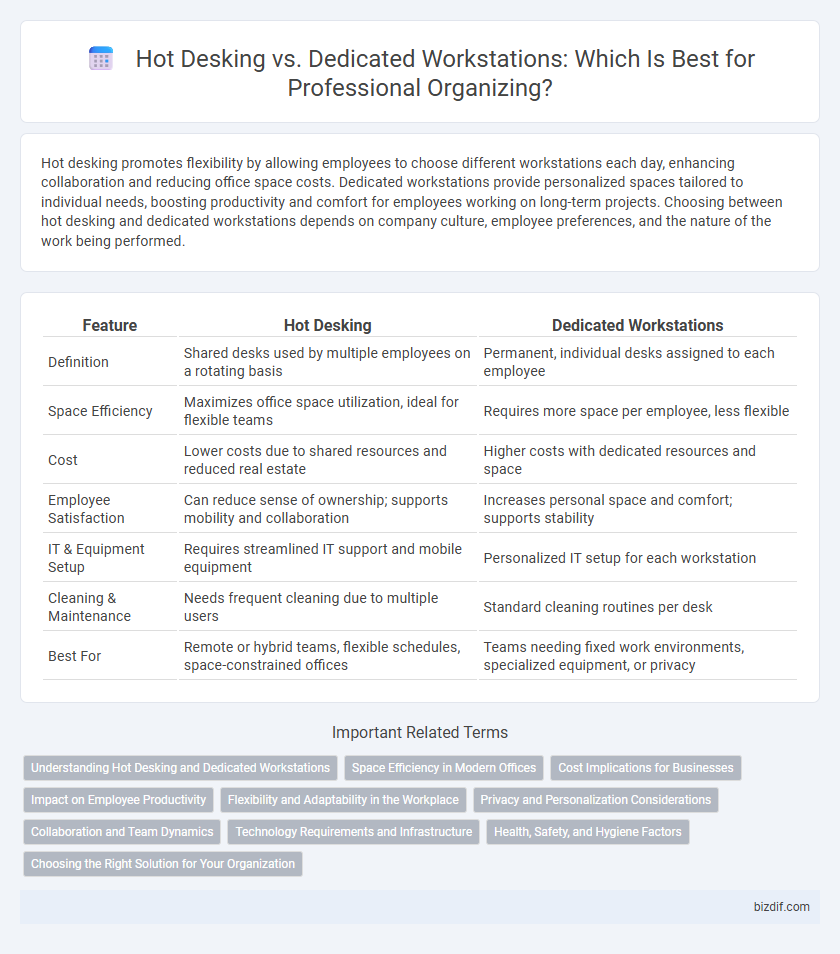Hot desking promotes flexibility by allowing employees to choose different workstations each day, enhancing collaboration and reducing office space costs. Dedicated workstations provide personalized spaces tailored to individual needs, boosting productivity and comfort for employees working on long-term projects. Choosing between hot desking and dedicated workstations depends on company culture, employee preferences, and the nature of the work being performed.
Table of Comparison
| Feature | Hot Desking | Dedicated Workstations |
|---|---|---|
| Definition | Shared desks used by multiple employees on a rotating basis | Permanent, individual desks assigned to each employee |
| Space Efficiency | Maximizes office space utilization, ideal for flexible teams | Requires more space per employee, less flexible |
| Cost | Lower costs due to shared resources and reduced real estate | Higher costs with dedicated resources and space |
| Employee Satisfaction | Can reduce sense of ownership; supports mobility and collaboration | Increases personal space and comfort; supports stability |
| IT & Equipment Setup | Requires streamlined IT support and mobile equipment | Personalized IT setup for each workstation |
| Cleaning & Maintenance | Needs frequent cleaning due to multiple users | Standard cleaning routines per desk |
| Best For | Remote or hybrid teams, flexible schedules, space-constrained offices | Teams needing fixed work environments, specialized equipment, or privacy |
Understanding Hot Desking and Dedicated Workstations
Hot desking involves employees sharing unassigned workspaces, promoting flexibility and efficient use of office real estate, particularly in dynamic or hybrid work environments. Dedicated workstations assign individual desks to employees, enhancing personalization, organization, and consistency for tasks requiring specific tools or privacy. Businesses weigh factors like collaboration needs, space optimization, and employee preferences when choosing between hot desking and dedicated workstations.
Space Efficiency in Modern Offices
Hot desking maximizes space efficiency by allowing multiple employees to share workstations, reducing the total number of desks needed in modern offices. Dedicated workstations offer personalized environments but occupy fixed space regardless of occupancy, leading to potential underutilization. Choosing hot desking supports flexible office layouts and optimizes square footage, essential for dynamic and cost-effective workspace management.
Cost Implications for Businesses
Hot desking significantly reduces real estate and utility expenses by maximizing the use of shared workspaces, leading to lower operational costs for businesses. Dedicated workstations require higher upfront investment in individual desks and personalized equipment, increasing initial capital expenditure and ongoing maintenance expenses. Companies aiming to optimize budgets often choose hot desking to enhance space efficiency and reduce overhead costs associated with fixed office setups.
Impact on Employee Productivity
Hot desking encourages flexible work environments that can increase collaboration and reduce office space costs, but may lead to distractions and decreased employee focus. Dedicated workstations offer personalized, consistent spaces that enhance comfort and concentration, fostering higher productivity for tasks requiring deep focus. Balancing these setups depends on organizational needs, with dedicated desks generally supporting sustained productivity in knowledge-intensive roles.
Flexibility and Adaptability in the Workplace
Hot desking enhances flexibility by allowing employees to choose workstations based on daily needs, promoting efficient space utilization and accommodating fluctuating team sizes. Dedicated workstations offer stability and personalization but can limit adaptability in dynamic office environments where remote work and hybrid schedules are common. Organizations prioritizing agility benefit from hot desking strategies, while those requiring consistent setups may prefer dedicated spaces for employee productivity.
Privacy and Personalization Considerations
Hot desking offers limited privacy and personalization due to shared workspaces, making it challenging to maintain confidentiality and customize setups. Dedicated workstations provide enhanced privacy through consistent use by the same individual, allowing personalized organization and ergonomic adjustments. Organizations aiming for secure, personalized work environments often benefit from dedicated workstations despite higher space requirements.
Collaboration and Team Dynamics
Hot desking promotes spontaneous collaboration and flexible team interactions by allowing employees to choose different workstations daily, fostering diverse communication patterns. Dedicated workstations support consistent team dynamics by providing personalized spaces that enhance focus and long-term relationship-building among team members. Balancing hot desking with dedicated areas can optimize collaboration while maintaining individual workflow stability in professional organizing.
Technology Requirements and Infrastructure
Hot desking demands flexible technology infrastructure with seamless wireless connectivity, robust cloud storage solutions, and easy access to shared devices like printers and monitors to support diverse user needs. Dedicated workstations require personalized, high-performance setups with stable wired connections, individual hardware configurations, and reliable power supply tailored to specific job functions. Efficient cable management, secure network access, and scalable IT resources are essential for both environments to optimize productivity and minimize downtime.
Health, Safety, and Hygiene Factors
Hot desking promotes hygienic work environments by encouraging regular cleaning and reducing personal clutter, which minimizes the buildup of germs on shared surfaces. Dedicated workstations provide ergonomic consistency and allow personalized setups, reducing the risk of repetitive strain injuries. Both systems require strict health and safety protocols, but hot desking demands more frequent sanitation to prevent cross-contamination among users.
Choosing the Right Solution for Your Organization
Hot desking maximizes space efficiency by allowing multiple employees to share workstations, reducing office footprint and fostering collaboration in dynamic work environments. Dedicated workstations provide personalized spaces that enhance employee comfort and productivity, critical for roles requiring specialized equipment or privacy. Evaluating factors such as team dynamics, work style flexibility, and organizational goals ensures selecting the optimal setup to boost efficiency and employee satisfaction.
hot desking vs dedicated workstations Infographic

 bizdif.com
bizdif.com